- Home
- Neil Gaiman
Anansi Boys Page 11
Anansi Boys Read online
Page 11
“The big breadfruit tree down by the pea patch, you mean?” asks his wife.
“Of course that’s the one I mean,” says Anansi. Then, in his weensy-weak voice, he says, “And you got to promise something else. Promise me that, as a memorial to me, you going to make a little fire at the foot of my grave. And, to show you ain’t forgotten me, you going to keep the little fire burning, and not ever let it go out.”
“We will! We will!” said Anansi’s wife and children, wailing and sobbing.
“And on that fire, as mark of your respect and your love, I want to see a lickle pot, filled with saltwater, to remind you all of the hot salt tears you shed over me as I lay dying.”
“We shall! We shall!” they wept, and Anansi, he closed his eyes, and he breathed no more.
Well, they carried Anansi down to the big breadfruit tree that grew beside the pea patch, and they buried him six feet down, and at the foot of the grave they built a little fire, and they put a pot beside it, filled with saltwater.
Anansi, he waits down there all the day but when night falls he climbs out of the grave, and he goes into the pea patch, where he picks him the fattest, sweetest, ripest peas. He gathers them up, and he boils them up in his pot, and he stuffs himself with them till his tummy swells and tightens like a drum.
Then, before dawn, he goes back under the ground, and he goes back to sleep. He sleeps as his wife and his sons find the peas gone; he sleeps through them seeing the pot empty of water and refilling it; he sleeps through their sorrow.
Each night Anansi comes out of his grave, dancing and delighting at the cleverness of him, and each night he fills the pot with peas, and he fills his tummy with peas, and he eats until he cannot eat another thing.
Days go by, and Anansi’s family gets thinner and thinner, for nothing ever ripens that isn’t picked in the night by Anansi, and they got nothing to eat.
Anansi’s wife, she looks down at the empty plates, and she says to her sons, “What would your father do?”
Her sons, they think and they think, and they remember every tale that Anansi ever told them. Then they go down to the tar pits, and they buy them sixpennyworth of tar, enough to fill four big buckets, and they take that tar back to the pea patch. And down in the middle of the pea patch, they make them a man out of tar: tar face, tar eyes, tar arms, tar fingers, and tar chest. It was a fine man, as black and as proud as Anansi himself.
That night, old Anansi, fat as he has ever been in his whole life, he scuttles up out of the ground, and, plump and happy, stomach swollen like a drum, he strolls over to the pea patch.
“Who you?” he says to the tar man.
The tar man, he don’t say one word.
“This is my place,” said Anansi to the tar man. “It’s my pea patch. You better get going, if you know what’s good for you.”
The tar man, he don’t say one word, he don’t move a muscle.
“I’m the strongest, mightiest, most powerful fellow there is or was or ever will be,” says Anansi to the tar man. “I’m fiercer than Lion, faster than Cheetah, stronger than Elephant, more terrible than Tiger.” He swelled up with pride at his power and strength and fierceness, and he forgot he was just a little spider. “Tremble,” says Anansi. “Tremble and run.”
The tar man, he didn’t tremble and he didn’t run. Tell the truth, he just stood there.
So Anansi hits him.
Anansi’s fist, it sticks solid.
“Let go of my hand,” he tells the tar man. “Let go my hand, or I’m going to hit you in the face.”
The tar man, he says not a word, and he doesn’t move the tiniest muscle, and Anansi hits him, bash, right in the face.
“Okay,” says Anansi, “a joke’s a joke. You can keep hold of my hands if you like, but I got four more hands, and two good legs, and you can’t hold them all, so you let me go and I’ll take it easy on you.”
The tar man, he doesn’t let go of Anansi’s hands, and he doesn’t say a word, so Anansi hits him with all his hands and then kicks him with his feet, one after another.
“Right,” says Anansi. “You let me go, or I bite you.” The tar fills his mouth, and covers his nose and his face.
So that’s how they find Anansi the next morning, when his wife and his sons come down to the pea patch by the old breadfruit tree: all stuck to the tar man, and dead as history.
They weren’t surprised to see him like that.
Those days, you used to find Anansi like that all the time.
CHAPTER SIX
IN WHICH FAT CHARLIE FAILS TO GET HOME, EVEN BY TAXI
DAISY WOKE UP TO THE ALARM. SHE STRETCHED IN HER BED like a kitten. She could hear the shower, which meant that her flatmate was already up. She put on a pink fuzzy dressing gown and went into the hall.
“You want porridge?” she called through the bathroom door.
“Not much. If you’re making it, I’ll eat it.”
“You certainly know how to make a girl feel wanted,” said Daisy, and she went into the kitchenette and put the porridge on to cook.
She went back into her bedroom, pulled on her work clothes, then looked at herself in the mirror. She made a face. She put her hair up into a tight bun at the back.
Her flatmate, Carol, a thin-faced white woman from Preston, stuck her head around the bedroom door. She was toweling her hair vigorously. “Bathroom’s all yours. What’s the word on the porridge?”
“Probably needs a stir.”
“So where were you the other night anyway? You said you were going off to Sybilla’s birthday drinks, and I know you never came back.”
“None of your beeswax, innit.” Daisy went into the kitchen and stirred the porridge. She added a pinch of salt and stirred it some more. She glopped the porridge into bowls and placed them on the counter.
“Carol? Porridge is getting cold.”
Carol came in, sat down, stared at the porridge. She was only half-dressed. “S’not a proper breakfast, is it? You ask me, a proper breakfast is fried eggs, sausages, black pudden, and grilled tomatoes.”
“You cook it,” said Daisy, “I’ll eat it.”
Carol sprinkled a dessert-spoonful of sugar on her porridge. She looked at it. Then she sprinkled another one on. “No, you bloody won’t. You say that you will. But you’ll start rabbiting on about cholesterol or what fried food is doing to your kidneys.” She tasted the porridge as if it might bite her back. Daisy passed her a cup of tea. “You and your kidneys. Actually, that might be nice for a change. You ever eaten kidneys, Daisy?”
“Once,” said Daisy. “If you ask me, you can get the same effect by grilling half a pound of liver, then weeing all over it.”
Carol sniffed. “That wasn’t called for,” she said.
“Eat your porridge.”
They finished their porridge and their tea. They put the bowls in the dishwasher and, because it was not yet full, did not turn it on. Then they drove in to work. Carol, who was now in uniform, did the driving.
Daisy went up to her desk, in a room filled with empty desks.
The phone rang as she sat down. “Daisy? You’re late.”
She looked at her watch. “No,” she said. “I’m not. Sir. Now is there anything else I can do for you this morning?”
“Too right. You can call a man named Coats. He’s a friend of the chief super. Fellow Crystal Palace supporter. He’s already texted me about it twice this morning. Who taught the chief super to text, that’s what I want to know?”
Daisy took down the details and called the number. She put on her most businesslike and efficient tone of voice and said, “Detective Constable Day. How can I help you?”
“Ah,” said a man’s voice. “Well, as I was telling the chief superintendent last night, a lovely man, old friend. Good man. He suggested I talk to someone in your office. I wish to report. Well, I’m not actually certain that a crime has been committed. Probably a perfectly sensible explanation. There have been certain irregularities, and, well, to be perfe
ctly frank with you, I’ve given my bookkeeper a couple of weeks’ leave while I try to come to grips with the possibility that he may have been involved in certain, mm, financial irregularities.”
“Suppose we get the details,” said Daisy. “What’s your full name, sir? And the bookkeeper’s name?”
“My name is Grahame Coats,” said the man on the other end of the telephone. “Of the Grahame Coats Agency. My bookkeeper is a man named Nancy. Charles Nancy.”
She wrote both names down. They did not ring any bells.
FAT CHARLIE HAD PLANNED TO HAVE AN ARGUMENT WITH SPIDER as soon as Spider came home. He had rehearsed the argument in his head, over and over, and had won it, both fairly and decisively, every time.
Spider had not, however, come home last night, and Fat Charlie had eventually fallen asleep in front of the television, half-watching a raucous game show for horny insomniacs, which seemed to be called Show Us Your Bum!
He woke up on the sofa, when Spider pulled open the curtains. “Beautiful day,” said Spider.
“You!” said Fat Charlie. “You were kissing Rosie. Don’t try to deny it.”
“I had to,” said Spider.
“What do you mean, you had to? You didn’t have to.”
“She thought I was you.”
“Well, you knew you weren’t me. You shouldn’t have kissed her.”
“But if I had refused to kiss her, she would have thought it was you not kissing her.”
“But it wasn’t me.”
“She didn’t know that. I was just trying to be helpful.”
“Being helpful,” said Fat Charlie, from the sofa, “is something you do that, generally speaking, involves not kissing my fiancée. You could have said you had a toothache.”
“That,” said Spider, virtuously, “would have been lying.”
“But you were lying already! You were pretending to be me!”
“Well, it would have been compounding the lie, anyway,” explained Spider. “Something I only did because you were in no shape to go to work. No,” he said, “I couldn’t have lied further. I would have felt dreadful.”
“Well, I did feel dreadful. I had to watch you kissing her.”
“Ah,” said Spider. “But she thought she was kissing you.”
“Don’t keep saying that!”
“You should feel flattered.” Spider said, “Do you want lunch?”
“Of course I don’t want lunch. What time is it?”
“Lunchtime,” said Spider. “And you’re late for work again. It’s a good thing I didn’t cover for you again, if this is all the thanks I get.”
“S’okay,” said Fat Charlie. “I’ve been given two weeks off. And a bonus.”
Spider raised an eyebrow.
“Look,” said Fat Charlie, feeling like it was time to move to the second round of the argument, “it’s not like I’m trying to get rid of you or anything, but I was wondering when you were thinking of leaving?”
Spider said, “Well, when I came here, I’d only planned to visit for a day. Maybe two days. Long enough to meet my little brother, and then I’d be on my way. I’m a busy man.”
“So you’re leaving today.”
“That was my plan,” said Spider. “But then I met you. I cannot believe that we have let almost an entire lifetime go by without each other’s company, my brother.”
“I can.”
“The ties of blood,” said Spider, “are stronger than water.”
“Water’s not strong,” objected Fat Charlie.
“Stronger than vodka, then. Or volcanoes. Or, or ammonia. Look, my point is that meeting you—well, it’s a privilege. We’ve never been part of each other’s lives, but that was yesterday. Let’s start a new tomorrow, today. We’ll put yesterday behind us and forge new bonds—the bonds of brotherhood.”
“You’re totally after Rosie,” said Fat Charlie.
“Totally,” agreed Spider. “What do you plan to do about it?”
“Do about it? Well, she’s my fiancée.”
“Not to worry. She thinks I’m you.”
“Will you stop saying that?”
Spider spread his hands in a saintly gesture, then ruined the effect by licking his lips.
“So,” said Fat Charlie, “what are you planning to do next? Marry her, pretending to be me?”
“Marry?” Spider paused and thought for a moment. “What. A horrible. Idea.”
“Well, I was quite looking forward to it, actually.”
“Spider does not marry. I’m not the marrying kind.”
“So my Rosie’s not good enough for you, is that what you’re saying?”
Spider did not answer. He walked out of the room.
Fat Charlie felt like he’d scored, somehow, in the argument. He got up from the sofa, picked up the empty foil cartons that had, the previous evening, held a chicken chow mein and a crispy pork balls, and he dropped them into the bin. He went into his bedroom, where he took off the clothes he had slept in in order to put on clean clothes, discovered that, due to not doing the laundry, he had no clean clothes, so brushed yesterday’s clothes down vigorously—dislodging several stray strands of chow mein—and put them back on.
He went into the kitchen.
Spider was sitting at the kitchen table, enjoying a steak large enough for two people.
“Where did you get that from?” said Fat Charlie, although he was certain that he already knew.
“I asked you if you wanted lunch,” said Spider, mildly.
“Where did you get the steak?”
“It was in the fridge.”
“That,” declaimed Fat Charlie, wagging his finger like a prosecuting attorney going in for the kill, “that was the steak I bought for dinner tonight. For dinner tonight for me and Rosie. The dinner I was going to be cooking for her! And you’re just sitting there like a, a person eating a steak, and, and eating it, and—”
“It’s not a problem,” said Spider.
“What do you mean, not a problem?”
“Well,” said Spider, “I called Rosie this morning already, and I’m taking her out to dinner tonight. So you wouldn’t have needed the steak anyway.”
Fat Charlie opened his mouth. He closed it again. “I want you out,” he said.
“It’s a good thing for man’s desire to outstrip his something or other—grasp or reach or something—or what else is Heaven for?” said Spider, cheerfully, between mouthfuls of Fat Charlie’s steak.
“What the hell does that mean?”
“It means I’m not going anywhere. I like it here.” He hacked off another lump of steak, shoveled it down.
“Out,” said Fat Charlie, and then the hall telephone rang. Fat Charlie sighed, walked into the hall, and answered it. “What?”
“Ah. Charles. Good to hear your voice. I know you’re currently enjoying your well-earned, but do you think it might be within the bounds of possibility for you to swing by for, oh, half an hour or so, tomorrow morning? Say, around ten-ish?”
“Yeah. Course,” said Fat Charlie. “Not a problem.”
“Delighted to hear it. I’ll need your signature on some papers. Well, until then.”
“Who was that?” asked Spider. He had cleaned his plate and was blotting his mouth with a paper towel.
“Grahame Coats. He wants me to pop in tomorrow.”
Spider said, “He’s a bastard.”
“So? You’re a bastard.”
“Different kind of bastard. He’s not good news. You should find another job.”
“I love my job!” Fat Charlie meant it when he said it. He had managed entirely to forget how much he disliked his job, and the Grahame Coats Agency, and the ghastly, lurking-behind-every-door presence of Grahame Coats.
Spider stood up. “Nice piece of steak,” he said. “I’ve set my stuff up in your spare room.”
“You’ve what?”
Fat Charlie hurried down to the end of the hall, where there was a room that technically qualified his residence
as a two-bedroom flat. The room contained several cartons of books, a box containing an elderly Scalextric Racing set, a tin box filled with Hot Wheels cars (most of them missing tires), and various other battered remnants of Fat Charlie’s childhood. It might have been a good-sized bedroom for a normal-sized garden gnome or an undersized dwarf, but for anyone else it was a closet with a window.
Or rather, it used to be, but it wasn’t. Not anymore.
Fat Charlie pulled the door open and stood in the hallway, blinking.
There was a room, yes; that much was still true, but it was an enormous room. A magnificent room. There were windows at the far end, huge picture windows, looking out over what appeared to be a waterfall. Beyond the waterfall, the tropical sun was low on the horizon, and it burnished everything in its golden light. There was a fireplace large enough to roast a pair of oxen, upon which three burning logs crackled and spat. There was a hammock in one corner, along with a perfectly white sofa and a four-poster bed. Near the fireplace was something that Fat Charlie, who had only ever seen them in magazines, suspected was probably some kind of Jacuzzi. There was a zebra-skin rug, and a bear pelt hanging on one wall, and there was the kind of advanced audio equipment that mostly consists of a black piece of polished plastic that you wave at. On one wall hung a flat television screen that was the width of the room that should have been there. And there was more…
“What have you done?” asked Fat Charlie. He did not go in.
“Well,” said Spider from behind him, “seeing as I’m going to be here for a few days, I thought I’d bring my stuff over.”
“Bring your stuff? Bringing your stuff is a couple of carrier bags filled with laundry, some PlayStation games and a spider plant. This is…this is…” He was out of words.
Spider patted Fat Charlie’s shoulder as he pushed past. “If you need me,” he said to his brother, “I’ll be in my room.” And he shut the door behind him.
Fat Charlie shook the doorknob. The door was now locked.
He went into the TV room, got the phone from the hall, and dialed Mrs. Higgler’s number.
“Who the hell is this at this time of the morning?” she said.
“It’s me. Fat Charlie. I’m sorry.”

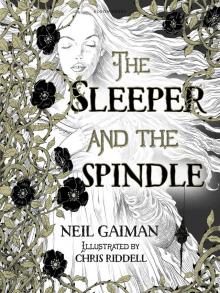 The Sleeper and the Spindle
The Sleeper and the Spindle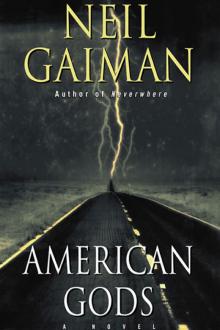 American Gods
American Gods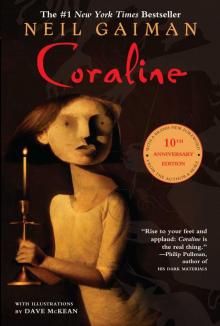 Coraline
Coraline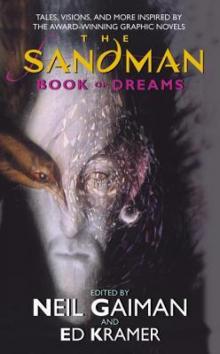 The Sandman: Book of Dreams
The Sandman: Book of Dreams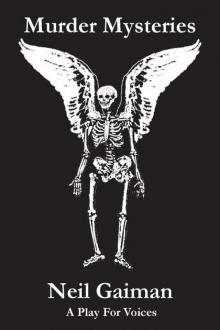 Murder Mysteries
Murder Mysteries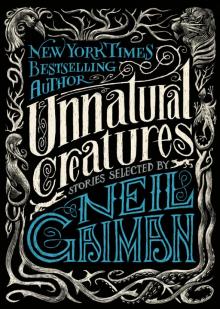 Unnatural Creatures
Unnatural Creatures Eternity's Wheel
Eternity's Wheel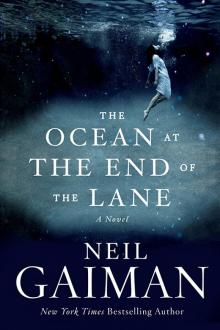 The Ocean at the End of the Lane
The Ocean at the End of the Lane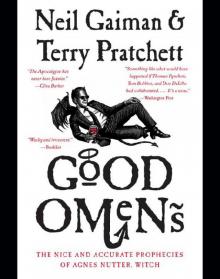 Good Omens
Good Omens Stardust
Stardust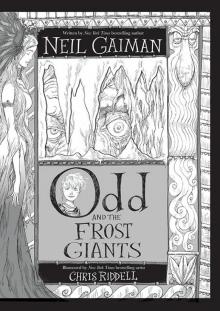 Odd and the Frost Giants
Odd and the Frost Giants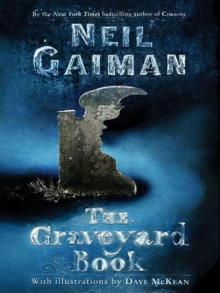 The Graveyard Book
The Graveyard Book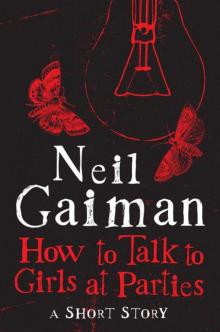 How to Talk to Girls at Parties
How to Talk to Girls at Parties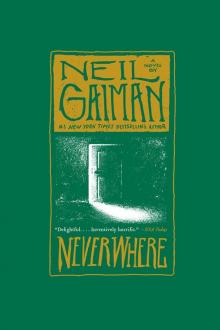 Neverwhere
Neverwhere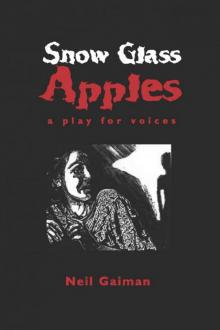 Snow, Glass, Apples
Snow, Glass, Apples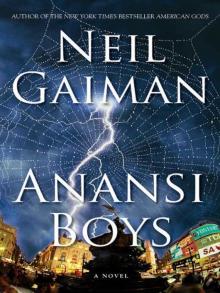 Anansi Boys
Anansi Boys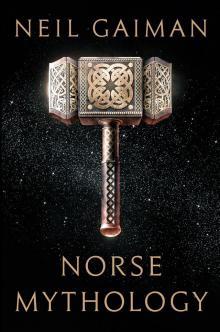 Norse Mythology
Norse Mythology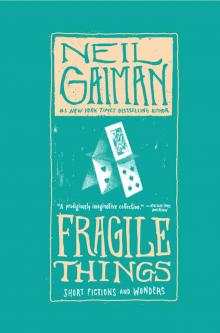 Fragile Things: Short Fictions and Wonders
Fragile Things: Short Fictions and Wonders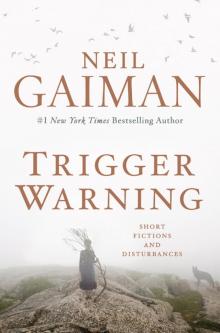 Trigger Warning: Short Fictions and Disturbances
Trigger Warning: Short Fictions and Disturbances InterWorld
InterWorld The Monarch of the Glen
The Monarch of the Glen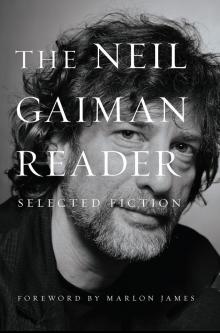 The Neil Gaiman Reader
The Neil Gaiman Reader The Silver Dream
The Silver Dream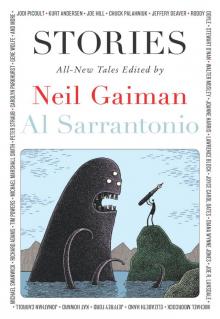 Stories
Stories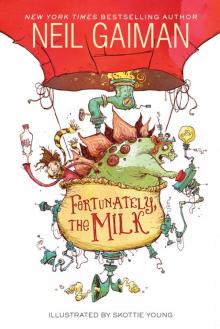 Fortunately, the Milk
Fortunately, the Milk Art Matters
Art Matters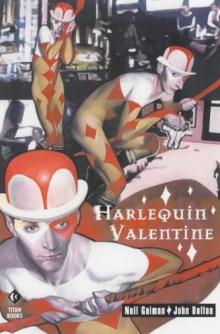 Harlequin Valentine
Harlequin Valentine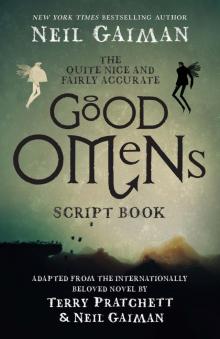 The Quite Nice and Fairly Accurate Good Omens Script Book
The Quite Nice and Fairly Accurate Good Omens Script Book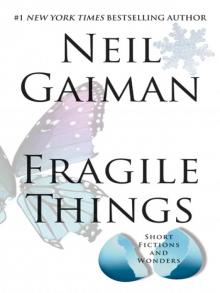 Fragile Things
Fragile Things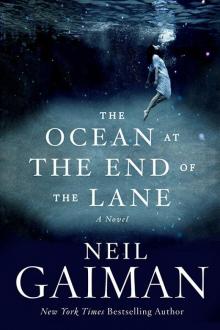 The Ocean at the End of the Lane: A Novel
The Ocean at the End of the Lane: A Novel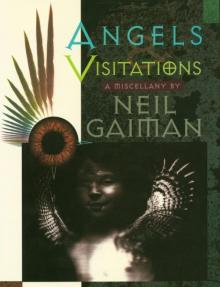 Angels and Visitations
Angels and Visitations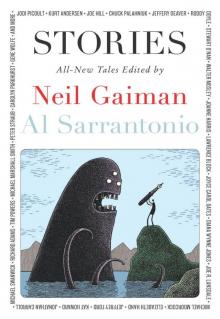 Stories: All-New Tales ngss-1
Stories: All-New Tales ngss-1 Don't Panic
Don't Panic Darker Terrors
Darker Terrors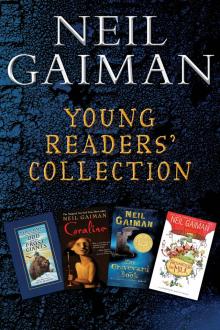 Neil Gaiman Young Readers' Collection
Neil Gaiman Young Readers' Collection A Study In Emerald
A Study In Emerald The Silver Dream: An InterWorld Novel
The Silver Dream: An InterWorld Novel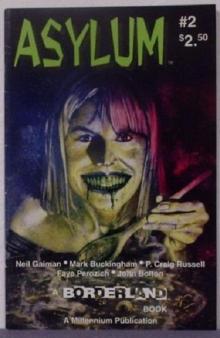 Feeders and Eaters
Feeders and Eaters Psychos
Psychos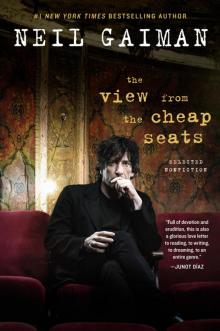 The View from the Cheap Seats
The View from the Cheap Seats Trigger Warning
Trigger Warning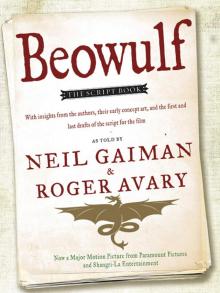 Beowulf
Beowulf Nessun Dove
Nessun Dove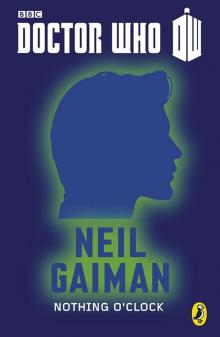 Doctor Who: Nothing O'Clock: Eleventh Doctor: 50th Anniversary
Doctor Who: Nothing O'Clock: Eleventh Doctor: 50th Anniversary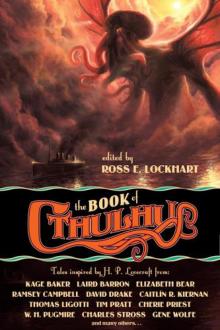 The Book of Cthulhu
The Book of Cthulhu